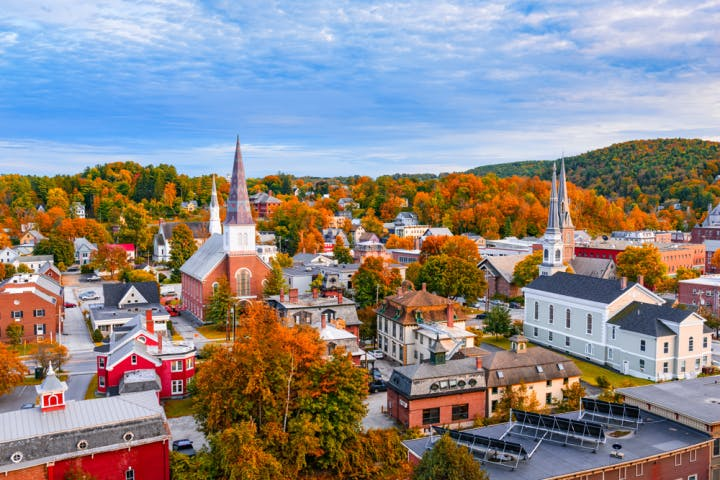
One would think that the small and chilly American Northeast states, unless you live there, are easy to ignore. Vermont, however, makes itself rather present, even with a population far smaller than many large cities. As one of the first states in the country, Vermont is replete with historical value, making it a place where many people love to visit and for many, a place to call home. Vermont’s small size is not joined with a large population density, which leads to a positive result: less crime.
In fact, when it comes to crime, Vermont is ranked #1 in the country, while the state is also ranked #1 in the country for property crime rates. Sure, population density (or lack thereof) has something to do with it, but a general respect for person and property runs through the veins of Vermont and its citizens. Not too surprising for a state where “Freedom and Unity” is the motto.
So all is good in the state of Vermont, right? No need for security measures at all? Not quite. As with most cities and states where crime is low, this doesn’t mean the state is crime free. Vermont residents will still need to consider how best to protect their homes, especially those who live in some of the state’s more densely populated cities. Home security in Vermont is still plenty necessary.
Home Security Provider Requirements for Vermont
Given that Vermont is highly lauded for its level of safety, one might question whether home security is a pressing matter anywhere in the state at all. For example, in Rutland, the per 1,000 people property crime rate of 26.67 is nearly double that of the Vermont average, and just above the national average. In Burlington, the situation is even worse with the property crime rate of 38.83 nearly three times that of the state average and well above the national average.
It’s clear that Vermont may be #1 in the country for safety, but it’s far from perfect. As such, home security exists for Vermont residents to help mitigate those risks. But with property crimes being so rare across the state, does Vermont’s government take seriously the concern many residents might have over home security provider practices? Well, yes and no.
On the one hand, Vermont’s government certainly acknowledges that home security systems exist and that they’re useful. However, the state government has no laws that govern businesses in that particular industry beyond your standard laws governing all businesses and dictating standard business ethics. Things such as fraud and other deceptive practices are handled by the Vermont Attorney General’s office, but there are no specifications about what alarm companies can and cannot do while offering service. In fact, the state’s laws that discuss electrical safety, in which one may usually find, at the least, mention of security alarms, fails to mention them at all (fire alarms are mentioned, however).
Indeed, if you do decide to purchase a home security system in Vermont, be warned: You’re more likely to have to register your own system than to find any real regulation on the company itself. Thankfully, there are ways to vet the different security companies that serve Vermont. Independent online research, including HomeAlarmReport's security company rankings, may help you land on the most reliable service in your state.
Home Security Camera Laws
While Vermont lacks security provider regulation, it has a very clearly stated anti-voyeurism law in place. According to state law, “No person shall intentionally conduct surveillance or intentionally photograph, film, or record in any format a person without that person’s knowledge and consent while the person being surveilled, photographed, filmed, or recorded is in a place where he or she would have a reasonable expectation of privacy within a home or residence.”
For Vermont residents interested in putting up security cameras, this means making sure that those cameras are not placed in any position where they might capture a neighbor’s house or property, and any place within your own home where someone might expect privacy. If you do have cameras in your home, it’s best to let guests know that there are cameras, and where those cameras are located so as to prevent accidentally capturing any guests in private or compromising positions.
Interestingly, Vermont has no case law regarding whether the state is a one or two-party state for audio recording. Instead, the state primarily specifies that accidentally picking up audio recordings is not illegal. In this sense, you may be able to keep your audio pickup capability preserved for your home security cameras, just making sure that the optical pickup is well away from places where you might capture individuals in private settings.
Safety During Natural Disasters
As a Northeast state, Vermont is a state prone to many natural disasters. Tornadoes are rare, hurricanes only infrequently sustain enough energy to reach the state, and earthquakes are typically too small to make much of a dent. However, as a Northeast state, it should come as no surprise that most of the state’s FEMA disaster declarations in the past have been related winter storms and flooding.
Indeed, those two areas, intense winter storms and flooding, are the common concern for Vermont during the winter and the summer. Fall and spring appear to be nice times in the state, while July through August and December through February tend to bring a lot of damaging weather.
During the summer, flooding can coincide with strong stormy weather. During those times, residents should take precautions. Ensure that you have an escape route well-planned out in advance should floods occur, and make sure you have emergency supplies sufficient for a flood: spare food, water, clothing, batteries, life jackets, and radios. If you do get stuck in your house during a flood, make for the upper levels of your home as fast as possible, and resort to accessing the roof only if necessary.
When winter comes along, be sure to respect winter at its worst. Strong snowstorms can kill, especially when it comes to the elderly or those who are generally unprepared. Make sure you have spare clothes, food, and water, as well an extra energy source. During winter storms, power can go out, which may result in a loss of heat for some people. If you have a fireplace, make sure to stockpile wood. For those with a gas stove, ensure that you have gas stored in the reserve tanks. Also consider purchasing a gas generator to supplement your energy needs should the power go out.
We can all thank Vermont for keeping the U.S. well supplied with syrup, and we should all be impressed with how the state is capable of keeping its property and crime rates low. Although Vermont residents may need to take a little extra precaution when purchasing a home security system, they can still boast proudly of their state’s undeniably impressive accomplishments.

